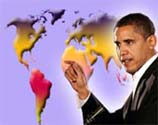Obama proclaims he's ready to lead on international stage
 Denver, Colorado/Washington - Barack Obama, a one-term Democratic senator from Illinois, has begun the tough challenge of convincing voters that he is ready to tackle a series of international crises facing the next president of the United States.
Denver, Colorado/Washington - Barack Obama, a one-term Democratic senator from Illinois, has begun the tough challenge of convincing voters that he is ready to tackle a series of international crises facing the next president of the United States.
It will be a key message as Obama campaigns for the White House between now and the November 4 general election. While abroad Obama is strongly preferred over his Republican rival John McCain, the case at home is more complicated.
Back in the United States, it is McCain - a Vietnam War veteran leaning heavily on his military and foreign policy expertise in the campaign to date - who has consistently held an edge in opinion polls on the question of who can best manage the country's national security challenges.
McCain and the Republican Party have been hammering Obama for months on his relative inexperience - Obama was elected to the Senate in 2004 compared to McCain's 25 years in Congress - arguing that he is naive and unprepared to lead the world's largest economy and most powerful military.
But Democrats began a serious fight-back this week, rolling out a series of speakers at the party's nominating convention in Denver, Colorado, who testified to Obama's judgement and leadership abilities and hammered McCain for following the policies - foreign and domestic - of President George W Bush.
Obama answered the call himself in his acceptance speech Thursday night before a roaring crowd of more than 75,000 people packed inside Denver's football stadium, Invesco Field.
"If John McCain wants to have a debate about who has the temperament, and judgment, to serve as the next commander in chief, that's a debate I'm ready to have," Obama said.
Obama helped close some of the experience gap with McCain by announcing last week that his vice president would be Joe Biden, a veteran senator and leading foreign policy voice of the party for decades.
But Obama has mostly sought to put the issue of judgment - not experience - at the forefront of the 2008 White House campaign, in the hopes of convincing voters that he will take a more conciliatory approach that is different from that of the unpopular Bush.
In some of his most aggressive words of the campaign to date, Obama slammed McCain - and Bush - for mishandling the wars in Iraq and Afghanistan and diverting resources from the fight against terrorism, al-Qaeda and its leader Osama Bin Laden.
"You don't defeat a terrorist network that operates in 80 countries by occupying Iraq," he said. "If John McCain wants to follow George Bush with more tough talk and bad strategy, that is his choice, but that is not the change that America needs."
Obama has made his early opposition to the war in Iraq a signature issue of the campaign. But the war also demonstrates the US public's skepticism of his foreign policy credentials.
Despite widespread opposition to the war, polling has shown Americans trust McCain to better manage its closing stages. McCain supported the invasion and takes credit for a 16-month troop surge that has helped reduce violence in Iraq.
Republicans have historically been viewed by voters as better able to manage national security policy, while Democrats have been favoured on the economy.
Obama at times on Thursday seemed to be speaking for all Democrats who have had their patriotism or ability to protect the country questioned over the years, harking back to revered Democratic presidents including Franklin Roosevelt and John F Kennedy.
"Don't tell me that Democrats won't defend this country. Don't tell me that Democrats won't keep us safe," Obama said. "The Bush-McCain foreign policy has squandered the legacy that generations of Americans - Democrats and Republicans - have built, and we are here to restore that legacy."
It was another theme that had been echoed time and time again during the party's four-day nominating convention in Denver.
John Kerry, the party's 2004 nominee, seemed to still bear the scars of his own bruising election campaign, when a conservative group's ads denigrating his own decorated military service in Vietnam were credited by many with winning the election for Bush.
"No one can question Barack Obama's patriotism," Kerry told the party convention gathering on Wednesday. The American flag "doesn't belong to any ideology ... it belongs to all the American people."
Republicans will likely continue hammering Obama on the experience question at their own nominating convention beginning Monday. (dpa)